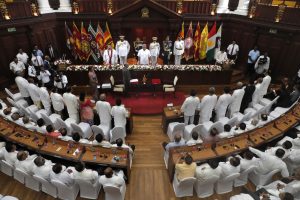Sri Lankan President Gotabaya Rajapaksa was swept into power with 6.9 million votes in November 2019 and subsequently saw his party’s control bolstered with a two-thirds majority in Parliament in the general election of August 2020. Yet by the summer of 2021, the popularity of the Rajapaksa presidency and regime is fast eroding. Social media in particular is rife with criticism of the president and his government, and there have been strikes in the health, education, administration, electricity, railways, and plantation sectors in recent months.
The management of the COVID-19 pandemic is one factor, although there is a prevailing belief that it could have been worse. The real issue is the economic repercussions of the pandemic in terms of the daily lives of Rajapaksa’s base constituency: the ability of people to provide their families three square meals a day, cover their medical expenses, and pay for their children’s education. In addition the government abruptly banned the import of chemical fertilizer, heralding a move toward organic agriculture. The manner in which this is being done has led to serious discontent within the farming community.
Overall, in economic terms, the key issues are the repayment of debt and the foreign exchange crisis. Reserves are at an alarming low, rating agencies have downgraded the economy considerably, and payments mount. Fitch Ratings, for example, estimates that the government will need $29 billion between now and 2026 to meet debt repayments. Currently foreign currency reserves are at $4 billion, sufficient for only 2.7 months of imports. The government nevertheless is adamant about not going to the International Monetary Fund for assistance.
Amid the deepening economic gloom, the government was keen to pass the Colombo Port City Commission Bill, which sought to set up a commission to regulate activity on land reclaimed from the sea by the Chinese. A substantial proportion of this land has been handed over to the Chinese on a 99-year lease.
The Colombo Port City project developments should be viewed in the context of the Rajapaksa regime’s further turn toward China. There were already close relations between the Chinese Communist Party and the ruling Sri Lanka People’s Front (SLPP). Now, via a string of foreign policy decisions, Sri Lanka is being drawn more and more into the Chinese orbit and into opposition with the interests of the Quad countries (the United States, India, Japan, and Australia).
The confrontationist orientation of Sri Lankan foreign policy, backstopped by the Chinese, has also resulted in a severe resolution on Sri Lanka in the U.N. Human Rights Council. The office of the High Commissioner is now tasked with setting up a unit to look at accountability for war crimes and crimes against humanity in Sri Lanka.
Put it all together, and the Rajapaksas’ return to power has been a decidedly difficult time for Sri Lanka.
































